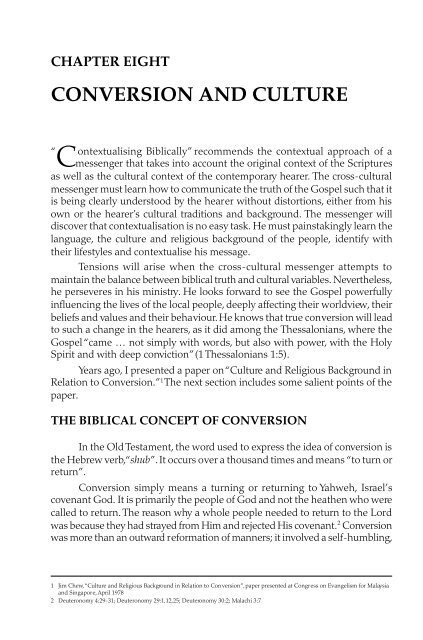WHEN YOU CROSS CULTURES - World Evangelical Alliance
WHEN YOU CROSS CULTURES - World Evangelical Alliance
WHEN YOU CROSS CULTURES - World Evangelical Alliance
Create successful ePaper yourself
Turn your PDF publications into a flip-book with our unique Google optimized e-Paper software.
CHAPTER EIGHT<br />
CONVERSION AND CULTURE<br />
“C ontextualising Biblically” recommends the contextual approach of a<br />
messenger that takes into account the original context of the Scriptures<br />
as well as the cultural context of the contemporary hearer. The cross-cultural<br />
messenger must learn how to communicate the truth of the Gospel such that it<br />
is being clearly understood by the hearer without distortions, either from his<br />
own or the hearer’s cultural traditions and background. The messenger will<br />
discover that contextualisation is no easy task. He must painstakingly learn the<br />
language, the culture and religious background of the people, identify with<br />
their lifestyles and contextualise his message.<br />
Tensions will arise when the cross-cultural messenger attempts to<br />
maintain the balance between biblical truth and cultural variables. Nevertheless,<br />
he perseveres in his ministry. He looks forward to see the Gospel powerfully<br />
influencing the lives of the local people, deeply affecting their worldview, their<br />
beliefs and values and their behaviour. He knows that true conversion will lead<br />
to such a change in the hearers, as it did among the Thessalonians, where the<br />
Gospel “came … not simply with words, but also with power, with the Holy<br />
Spirit and with deep conviction” (1 Thessalonians 1:5).<br />
Years ago, I presented a paper on “Culture and Religious Background in<br />
Relation to Conversion.” 1 The next section includes some salient points of the<br />
paper.<br />
THE BIBLICAL CONCEPT OF CONVERSION<br />
In the Old Testament, the word used to express the idea of conversion is<br />
the Hebrew verb, “shub”. It occurs over a thousand times and means “to turn or<br />
return”.<br />
Conversion simply means a turning or returning to Yahweh, Israel’s<br />
covenant God. It is primarily the people of God and not the heathen who were<br />
called to return. The reason why a whole people needed to return to the Lord<br />
was because they had strayed from Him and rejected His covenant. 2 Conversion<br />
was more than an outward reformation of manners; it involved a self-humbling,<br />
1 Jim Chew, “Culture and Religious Background in Relation to Conversion”, paper presented at Congress on Evangelism for Malaysia<br />
and Singapore, April 1978<br />
2 Deuteronomy 4:29-31; Deuteronomy 29:1,12,25; Deuteronomy 30:2; Malachi 3:7<br />
51

















